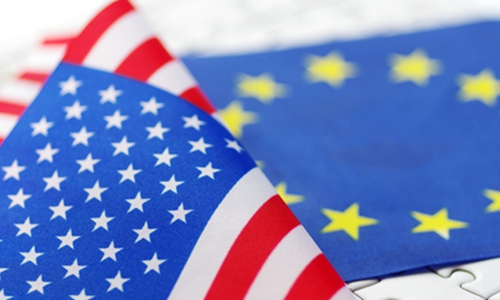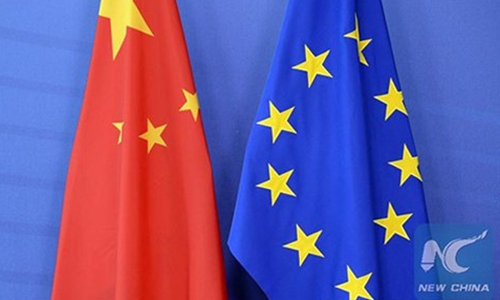
Photo: IC
Recent conflict between the US and Germany over troop pullout has become a focus of global opinion. On June 5, US President Donald Trump, without consulting Germany or NATO, unilaterally ordered the withdrawal of 9,500 US troops from Germany. Trump's reason may have been laid bare when he said that the US is not "the policeman of the world" on Saturday. According to media reports, EU foreign ministers will hold video talks with US Secretary of State Mike Pompeo on Monday.
On June 4, US senators announced a bill to expand sanctions on the German-Russian the Nord Stream 2 gas pipeline project. Almost at the same time, German Chancellor Angela Merkel declined the invitation to attend the G7 summit in the US in person citing concern over the novel coronavirus pandemic.
This pattern of tensions cuts deep between Berlin and Washington.
The contradictions between Germany and the US have been prominently displayed over the past few years. They are at odds over NATO, refugees, trade, the Paris Climate Agreement, the Iran nuclear deal, and relations between Germany and Russia.
It should be noted that the US-Germany conflict is a part of the broader conflict between Europe and the US. In the past few years, the Trump administration has ignored the interests and concerns of its European allies. As a consequence, European countries have lost their confidence in the US. They have also questioned the value and future of the transatlantic alliance.
The Trump administration unilaterally trampled on major European security interests in an oversimplified and crude way. For instance, the US has withdrawn from the Iran nuclear deal, assassinated an important leader of the Iranian military without informing its allies in advance. It intensified Palestinian-Israeli conflicts and tensions in the Middle East.
The US treats Europe as an economic competitor rather than a strategic partner. It imposes tariffs on EU steel and aluminum products exported to the US.
Moreover, the US shows indifference and even hostility towards European integration, and is happy watching the EU crumbles.
In short, the current Trump administration has caused a comprehensive challenge to Europe in many fields such as diplomacy, security, economy, etc.
There is no doubt that in addition to Trump, there are other deeper reasons for the changes and uncertainties in the current relationship between Europe and the US.
First, the differences in geopolitical policies between Europe and the US have become increasingly apparent.
The focus of the US strategy has shifted to Asia-Pacific region. It means the US is having less sensitivity to European concerns and interests. The US regards China as its top adversary and security threat now. Europe doesn't totally share this stance. Europe has its own interests, and does not necessarily approve of the US' perception of security threats. The security interests of Europe are mainly in its surrounding areas. In this regard, the US has become the biggest disruptor of European interests.
Second, the competition between the US and Europe in the economic field is becoming increasingly fierce, and the rivalry between them is becoming stronger. In the traditional manufacturing sector, Europe has a greater advantage over the US - and the US is increasingly dissatisfied with the fact.
Third, profound changes are taking place within the society and politics in Europe and the US respectively. On both sides of the Atlantic, populism has become an increasingly prominent social and political phenomenon. In nature, populism is about nationalism rather than internationalism; anti-globalization rather than embracing globalization; unilateralism rather than multilateralism; and confrontation rather than cooperation.
Thanks to the populism and nationalism of the Trump administration, the US is destined to despise all traditional value systems, including the transatlantic alliance. European populism supported by the US will further weaken the so-called value basis of the transatlantic alliance.
Overall, the contradictions and conflicts between Europe and the US will become more prominent in the future. On the one hand, the US is unwilling to contribute and no longer believes that the alliance with Europe is positive assets. It is reassessing its national interests, including whether it is necessary to maintain the alliance system at the cost of economic contribution and military protection.
On the other hand, Europe was accustomed to the protection of the US. The continent is thus in urgent need to adjust itself to the new situation as well as its US policies.
It is probably impossible for the US-European relationship to return to the past. The US has changed - it is suspicious and irritable rather than confident. It resorts to extreme measures in order to maintain its hegemonic position, including damaging the international order and the interests of its allies. On the other hand, Europe is also changing. The UK has left the EU, and the US has lost its biggest partner in influencing Europe. What's more, Europe has begun to seriously prepare for a Plan B - enhancing its strategic autonomy.
The author is director of the Institute of European Studies at the China Institutes of Contemporary International Relations. opinion@globaltimes.com.cn


